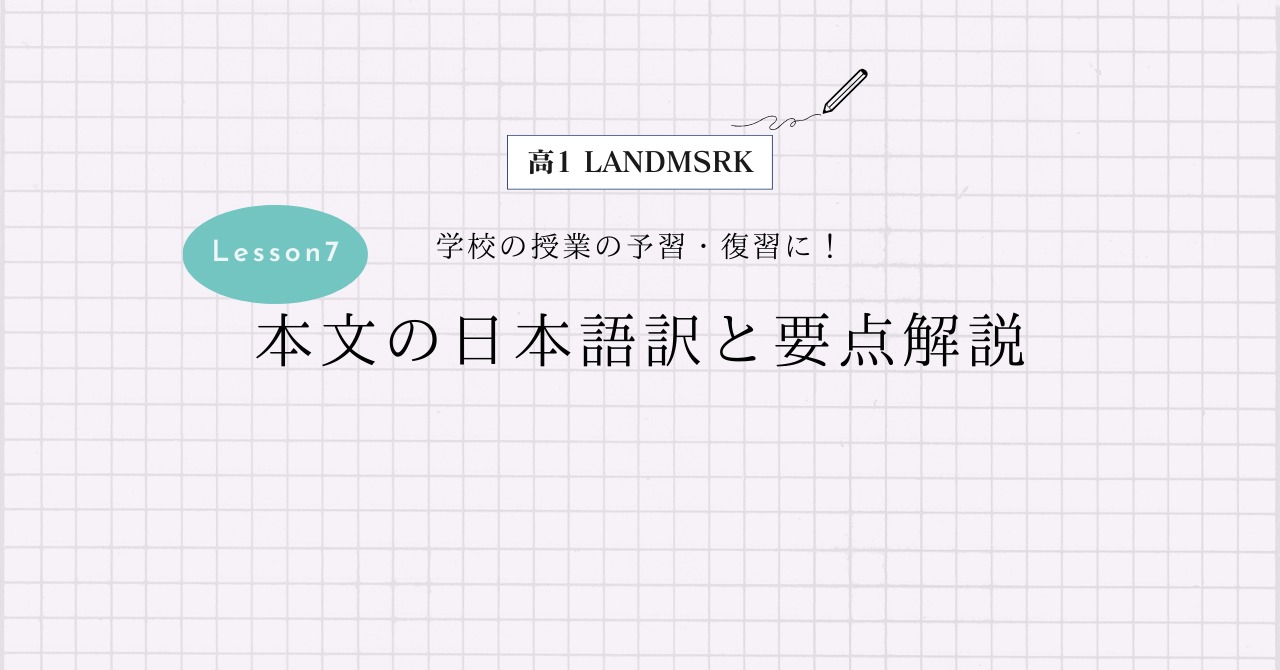啓林館 高1LANDMARK Lesson7 Part3の本文の日本語訳と重要箇所の解説です。
Lesson7-1, 7-2, 7-4の解説はこちらからご覧ください。
>高1LANDMARK Lesson7 Part1 本文和訳
>高1LANDMARK Lesson7 Part2 本文和訳
>高1LANDMARK Lesson7 Part4 本文和訳
- LANDMARK Lesson7 Part3 本文と日本語訳
- LANDMARK Lesson7 Part3 重要事項の解説
- Because of the great influence of her messages, the Syrian government regarded her as a dangerous person.
- To protect her, Bana’s family was evacuated to the neighboring country, Turkey, in 2016.
- Even after leaving Syria, she did not stop sending messages for peace.
- She was not only active on the Internet, but she also sent letters to the leaders of some countries.
- She wrote in the letters that everyone in the world should live in peace.
- Unfortunately, because of the complexity of the situation, messages for peace alone could not end the war.
- So, did Bana’s words mean nothing?
- Were the messages of encouragement to her meaningless?
- Bana had this to say: “As I hid in the basement for hours and hours, mom and I would read the messages.
- Reading them, we felt people cared about us, and we weren’t alone.
- When I was taking photos and videos on the street, people said, ‘Thank you, Bana.’
- People liked me telling the whole world not to forget Aleppo because they all thought they had been forgotten by the world.”
- Mr. president, I hope you are ok.
- Could you please help the people of Ghouta in Syria?
- Many children were killed and the bombing doesn’t stop.
- I am asking you to stop this killing.
- Please, do it for the children, you know they have no crime.
- Will you help, Mr. president?
- I really want you do everything you can.
- LANDMARK Lesson7 Part3 まとめ
LANDMARK Lesson7 Part3 本文と日本語訳
Q1. Why did Bana’s family move to Turkey in 2016?
「なぜバナの家族は2016年にトルコに引っ越したのですか?」
Q2. How did Bana and her mother feel when they were reading the messages from people?
「バナと母親は人々からのメッセージを読んでいたとき,どう感じましたか?」
Because of the great influence of her messages, the Syrian government regarded her as a dangerous person.
「彼女のメッセージの大きな影響力を理由に,シリアの政府は彼女を危険人物と見なしました。」
To protect her, Bana’s family was evacuated to the neighboring country, Turkey, in 2016.
「彼女を守るために,バナの家族は2016年に隣国のトルコに避難しました。」
Even after leaving Syria, she did not stop sending messages for peace.
「シリアを離れた後でさえも,彼女は平和のためにメッセージを送ることをやめませんでした。」
She was not only active on the Internet, but she also sent letters to the leaders of some countries.
「彼女はインターネット上で積極的だっただけではなく,いくつかの国のリーダーにも手紙を送りました。」
She wrote in the letters that everyone in the world should live in peace.
「彼女は手紙の中で,世界中の人はみんな平和に生きるべきですと書きました。」
Unfortunately, because of the complexity of the situation, messages for peace alone could not end the war.
「不運にも,状況が複雑だったため,平和を求めるメッセージだけでは戦争を終わらせることはできませんでした。」
So, did Bana’s words mean nothing?
「では,バナの言葉は何も意味がなかったのでしょうか?」
Were the messages of encouragement to her meaningless?
「彼女への励ましのメッセージは無意味だったのでしょうか?」
Bana had this to say: “As I hid in the basement for hours and hours, mom and I would read the messages.
「バナはこのように言いました。『私が何時間も地下に隠れていたとき,母と私はよくメッセージを読んでいました。』」
Reading them, we felt people cared about us, and we weren’t alone.
『それらを読むと,人々が私たちを心配してくれていて,私たちは1人ではないと感じました。』
When I was taking photos and videos on the street, people said, ‘Thank you, Bana.’
『通りで写真と動画を撮っているときに,人々は『ありがとう,バナ。』と言ってくれました。』
People liked me telling the whole world not to forget Aleppo because they all thought they had been forgotten by the world.”
『人々は,私が全世界にアレッポのことを忘れないようにと伝えることが好きでした。なぜなら彼ら全員が,自分たちは世界に忘れられていたと思っていたからです。』
To president Macron
「マクロン大統領へ」
Mr. president, I hope you are ok.
「大統領様,あなたがお元気だと嬉しいです。」
Could you please help the people of Ghouta in Syria?
「シリアのグータの人々を助けていただけませんか?」
Many children were killed and the bombing doesn’t stop.
「多くの子どもたちが殺され,爆撃は止まりません。」
I am asking you to stop this killing.
「私はあなたにこの殺戮を止めてほしいと頼み続けています。」
Please, do it for the children, you know they have no crime.
「どうか子どもたちのためにお願いします。彼らには罪はないと分かっていると思います。」
Will you help, Mr. president?
「大統領様,助けてくれませんか?」
I really want you do everything you can.
「私はあなたにできることを全てやってほしいと強く思っています。」
Thank you.
「ありがとうございます。」
From: Bana.
「バナより」

LANDMARK Lesson7 Part3 重要事項の解説
Because of the great influence of her messages, the Syrian government regarded her as a dangerous person.
“because of~”は「~のため,~が理由で」という重要表現です。
“influence”は「影響(力)」,“government”は「政府」という名詞で,“Syrian”は「シリアの」,“dangerous”は「危険な」という形容詞になります。
“regard A as B”は「AをBとして見なす」という重要表現ですね。
To protect her, Bana’s family was evacuated to the neighboring country, Turkey, in 2016.
“protect”は「を守る」という動詞で,“To protect”は「不定詞の名詞的用法」になっています。
“evacuate”は「を避難させる」という動詞で,ここでは「受動態」になっているので「避難した」という訳になります。
“neighboring”は「隣接の,近隣の」という形容詞で,“Turkey”は「トルコ」です。
“the neighboring country”と“Turkey”は「同格語」になります。“名詞,名詞”の並びは「同格語」の可能性が高いですよ!
Even after leaving Syria, she did not stop sending messages for peace.
“even”は「~でさえ」という副詞で,“after”は「~の後」という前置詞ですね。
“leave”は「を離れる」といった動詞で,“after”は前置詞なので”leaving”と「動名詞」になっています。
“stop 動名詞”は「~することをやめる」という重要表現です。“stop to 動詞の原形”にすると,「~するために立ち止まる」という全く違うニュアンスになってしまいます。
“peace”は「平和」という名詞ですね。
She was not only active on the Internet, but she also sent letters to the leaders of some countries.
“not only A but also B”は「AだけでなくBもまた」という重要表現です。
“active”は「積極的な,活発な」という形容詞で,“leader”は「リーダー,指導者」という名詞になります。
“sent”は“send(を送る)”の過去形ですね。
“of”は前置詞で,”A of B”の形で「BのA」というように後ろから前に訳します。
She wrote in the letters that everyone in the world should live in peace.
“that”は「接続詞」で,“wrote”の内容を示しています。
“should”は「~すべきだ,~のはずだ」という助動詞ですね。
Unfortunately, because of the complexity of the situation, messages for peace alone could not end the war.
“unfortunately”は「不運にも」という副詞です。
“complexity”は「複雑さ」,“situation”は「状況,情勢」,“war”は「戦争」という名詞になります。
“alone”は「1人で,~だけで」という副詞で,“end”は「を終える」という動詞ですね。
So, did Bana’s words mean nothing?
“so”は「では」くらいで訳せばOKです。
“mean”は「を意味する」という動詞で,“nothing”は「何も~ない」という文を否定の意味にする名詞になります。
Were the messages of encouragement to her meaningless?
“encouragement”は「激励,励まし」という名詞になります。
“meaningless”は「無意味な」という形容詞です。
Bana had this to say: “As I hid in the basement for hours and hours, mom and I would read the messages.
“have this to say”は「このように言う」という表現になります。
“as”は「~のとき」という前置詞で,“hid”は“hide(隠れる)”の過去形,“basement”は「地下」という名詞,“for hours and hours”は「何時間も」という意味です。
“would”はおそらく「過去の習慣」を表していて,「よく~していた」くらいで訳します。
Reading them, we felt people cared about us, and we weren’t alone.
この文は「分詞構文」になっています。
“When we read them,”の“When we”が省略されていますね。
“them”は“the messages”を指しています。
“felt”は“feel(感じる)”の過去形で,後ろには「接続詞that」が省略されています。
“care about~”は「~を心配する,気に掛ける」という動詞で,“alone”は「1人の」という形容詞になります。
When I was taking photos and videos on the street, people said, ‘Thank you, Bana.’
この文では「接続詞when」が使われていますね。
“take a photo”は「写真を撮る」という意味で,ここでは「過去進行形」になっています。
“video”は「動画」,“street”は「通り,ストリート」という名詞です。
People liked me telling the whole world not to forget Aleppo because they all thought they had been forgotten by the world.”
“tell 物 to 人”で「人に物を教える,伝える」という重要表現で,ここでは「動名詞」になっています。
また,「動名詞」の前にある“me”は「動名詞の意味上の主語」を表していて,“tell”を行ったのが“me”,つまり「私」ということになります。
“whole”は「全体の」という形容詞で,“forget”は「を忘れる」という動詞ですね。過去分詞形は“forgotten”です。
“not to forget”は「不定詞の副詞的用法」の否定形になります。
“because”は「接続詞」で,“they”は“People”を指しています。
“all”が主語にかかる場合は,助動詞・be動詞の後ろか一般動詞の前に置くことができます。
“thought”は“think(を考える,と思う)”の過去形で,後ろには「接続詞that」が省略されています。
また,最後に「過去完了」も使われていますね。
Mr. president, I hope you are ok.
“president”は「大統領,社長」という名詞です。
“hope”は「を望む,だといいなと思う」といった動詞で,後ろには「接続詞that」が省略されています。
Could you please help the people of Ghouta in Syria?
“could(would) you~?”は「~していただけませんか?」という表現です。
“please”は「どうか,お願いします」といった副詞ですね。
Many children were killed and the bombing doesn’t stop.
“kill”は「を殺す」という動詞で,ここでは「受動態」になっていますね。
“bombing”は「爆撃」という名詞ですね。
I am asking you to stop this killing.
“ask 人 to 動詞の原形”は「人に~するよう頼む」という重要表現で,ここでは「現在進行形」になっています。
“killing”は「殺害」といった名詞になります。
Please, do it for the children, you know they have no crime.
この文は「丁寧な命令文」になっていますね。
“do”は「代動詞」で,“do it”は“stop this killing”を指しています。
また,“know”の後ろには「接続詞that」が省略されていて,“they”は“the children”を指していますね。
“crime”は「罪,犯罪」という名詞になります。
Will you help, Mr. president?
“will(can) you~?”は「~してくれませんか?」という重要表現です。
丁寧に言うときは,先ほど説明した“could(would) you~?”「~していただけませんか?」を使います。
I really want you do everything you can.
ここでは“to”が抜けていますが,“want 人 to 動詞の原形”で「人に~してほしい」という重要表現です。
“everything”は「すべてのこと・もの」という名詞で,後ろには「目的格の関係代名詞」“that/which”が省略されています。
“you can”が先行詞”everything”を修飾していますね。
LANDMARK Lesson7 Part3 まとめ
以上がLANDMARK Lesson7 Part3の日本語訳となります。
「分詞構文」「動名詞の意味上の主語」「不定詞の否定形」などの使い方をしっかり確認しておきましょう!
>高1LANDMARK Lesson7 Part1 本文和訳
>高1LANDMARK Lesson7 Part2 本文和訳
>高1LANDMARK Lesson7 Part4 本文和訳
何か分からない点や他に解説してほしい点があれば,お気軽にコメントしてください!



コメント